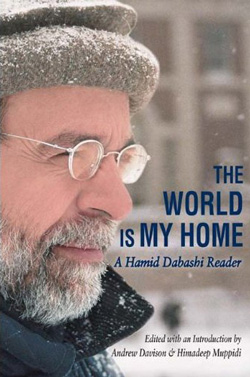As recent events indicate, Iranian, Middle Eastern, and Islamic politics more broadly have been deeply influential in world affairs. Hamid Dabashi has been a highly visible and prominent commentator on these affairs, explaining, interpreting, and providing a critical perspective. This volume gathers together his most influential and insightful writings. As one of the foremost contemporary public intellectuals and scholars of our time, Dabashi’s interests and writings span subjects ranging from Islamic philosophy and political ideology to Iranian art and Persian literature, from Sufism and Orientalism to Iranian and world cinema and contemporary Arab and Muslim visual arts; and from postcolonial theory and globalization to imperialism and public affairs. There is a direct connection between his theoretical innovations and the angle of his public interventions on the urgently global issues of the day. This book brings together some of his most important writings, especially those which offer new ways of understanding Islam, Iran, Islamist ideology, global art, and the condition of global modernity more generally. The book shows the underlying conceptual themes that unify Dabashi’s wide-ranging and brilliantly insightful corpus. Dabashi combines deep knowledge of the subject matter about which he writes, and highly refined sociological, hermeneutical, and cultural interpretive skills, moving far beyond the limiting, distorted, and intellectually stifling character of reigning absolutist conventions. He places existing authoritative frameworks under close scrutiny in order to produce novel and penetrating insights. These essays reflect historical and geographical worlds that are best viewed when Hamid Dabashi’s work is read as a whole, which this one volume work makes possible for the first time.
From the Introduction by Andrew Davison and Himadeep Muppidi
I stumbled across Hamid Dabashi, by chance, in the basement bookstore of the University of Minnesota in the early 1990s. I was a graduate student and, as was my habit, was browsing the shelves of “the Middle East” section when a provocative title framed on the thick spine of one of the volumes caught my eye. Theology of Discontent, it said. Theology of Discontent? I needed to look at it again. Theology of Discontent: The Ideological Foundation of the Islamic Revolution in Iran.
I had been reading books and articles about the Iranian revolution and was fairly dissatisfied with most accounts. None of them seemed to address the revolution’s motivating ideas in any significant depth. Some tired me with their narcissistic description of the revolution as America’s failure, while others confounded me by instructing me to think of Ayatollah Khomeini and his revolutionary associates as anachronistic beings, somehow out of place in the contemporary world. My hermeneutic disposition rebelled against these suggestions. It was in this context that discovering Theology of Discontent was profoundly satisfying — a conceptualization of the revolution in terms of its ideological foundations, an impressively comprehensive theoretical analysis, entire chapters devoted to the main revolutionary ideologues. Dabashi’s study immediately transported me into the languages of revolutionary politics in Iran. I bought the book right away and have been teaching it in one form or another since then. Though I only met him in 2005, Hamid Dabashi has been a constant companion in my classrooms and in my thinking for the last fifteen years.
Hamid Dabashi is the Hagop Kevorkian Professor of Iranian Studies and Comparative Literature at Columbia University. His work spans subjects ranging from Islamic philosophy and political ideology to Iranian art and Persian literature, from Sufism and Orientalism to Iranian and world cinema and contemporary Arab and Muslim visual arts; and from postcolonial theory and globalization to imperialism and public affairs. But more than anything else, he is a postcolonial and cosmopolitan intellectual who has made significant, original contributions to global political thought. He is that rare thinker whose scholarship exhibits both a systemic, theoretical dimension as well as a rich understanding of the interwoven character of historically and culturally complex societies. He is also a scholar who, somewhat uncharacteristically for scholars today, is oriented towards a public, and proudly dissident, role. This often means that there is a direct connection between his theoretical innovations and the angle of his public interventions on the urgently global issues of the day.
Dabashi’s writings have cast new light upon some of the most spectacular, world-historical changes and dynamics of the post-Cold war era — the Iranian revolution, the collapse of communism, the wars in the Persian/Arabian Gulf, the attacks of September 11, 2001, the “global war on terrorism,” and The Green Movement in Iran. He has helped rescue and refurbish public understandings of the plurality of Islam and its diverse ideological, philosophical, literary, and aesthetic traditions, and he has brought home the profound political, social, and cultural importance of a global philosophical and aesthetic consciousness.
My introduction to Hamid Dabashi began as my friend Andy’s mischievous and cryptic way of saying to me: “Look, you want to “provincialize Europe?” Here are the byways, highways, secret tunnels, oases in, around, and through the European desert. Don’t waste your time with them. Dwell in these lanes. Here lie the ways of other life-worlds, other wonderlands, in which we and millions of others are already at home.”
Endorsements
“If anyone can lay claim to Nima Yushij’s statement that this world is his home, it is Hamid Dabashi. His book of that name is learned, poetic, ranging from philosophy to film, every word written with a commitment to the possibility of a just world. I have worked with him in the past and will work with him again in the future. I want a very broad readership to know the quality of his writing and thinking, of his immense epistemic and historical scholarship. This book serves that purpose.”
— Gayatri Chakravorty Spivak, University Professor in the Humanities, Columbia University
“Hamid Dabashi is one of the foremost exponent today of postcolonial critical theory, whose work deserves to be called post-colonial with all the multivalence of this description. In his work, post-coloniality does not mean a denial or denunciation of the modern European tradition of philosophy and social theory, but their effortless absorption into a larger, more complex reflection. This collection shows the strong, inimitable particularity of his voice, which articulates a thinking with a wide universalist appeal. Dabashi has an astonishing ability to range over some of the most complex issues of modern intellectual life — the strange, unpredictable transformations of religious thought in the peculiar crucible of modernity, the complex interaction between authority of religion and the power of the modern state, and the new strands of aesthetics that some peculiarly modern forms like cinema has produced. Equally fluent in philosophical reasoning, literary interpretation, visual hermeneutics and writing with a rare combination of penetration and lyricism, Dabashi’s work continues values of both modern criticial theory and the highly sophisticated and subtle intellectual traditions of Iranian Islamic reflection — for both of which he is an wonderfully sympathetic reader. From the deep interrogation of the intrinsic paradoxicality of the tradition of Shi’i Islam to the formation of the state, to the constitution of the national subject — this collection covers an immense range of subjects. Additionally, as a writer, Dabashi has a gift of language which is adequate for the demands that all these dissimilar subjects place on his thinking. This is an excellent collection which places before its readers a truly wide-ranging and astonishing body of work.”
— Sudipta Kaviraj, professor of Indian Politics and Intellectual History, Department of Middle Eastern, South Asian and African Studies, Columbia University
“Hamid Dabashi’s writings on Iranian culture and politics brilliantly re-imagine the rich heritage of a shared past and a conflicted present. His reflections on revolution and nationhood, poetry and cinema, philosophy and the sacred, are urgent, provocative, complex, and highly original.”
— Timothy Mitchell, Columbia University
“Hamid Dabashi belongs to a marvelous tradition of poetic thinkers, whose deep insights are crafted in magnificent poetic prose, thus providing his readers with the wine of literary pleasure along with rich food for thought. This nicely introduced and judiciously selected anthology of his writings is a very welcome addition to the literature on Iran, Islam, cinema studies and cultural studies.”
— Gilbert Achcar, professor at the School of Oriental and African Studies of the University of London
The World Is My Home:
A Hamid Dabashi Reader
Table of Contents
| Acknowledgements | 3 |
| Introduction | 5 |
| PART I. Counter-imagining Islam and Iran | 27 |
| Islams | 28 |
| 1. In the Absence of the Face | 29 |
| 2. Shi’ism as Paradox | 85 |
| 3. Counter-imagining the Sacred | 97 |
| Islamic Ideology | 125 |
| 4. The Power of Interpretation | 126 |
| 5. Blindness and Insight: The Predicament of a Muslim Intellectual | 141 |
| Iran | 168 |
| 6. On Nations Without Borders | 169 |
| 7. Khomeini’s Revolution | 194 |
| PART II. Emancipatory Aesthetics | 201 |
| Poetic Revolution | 202 |
| 8. Nima Yushij and Constitution of a National Subject | 203 |
| 9. Forugh Farrokhzad and the Formative Forces of Iranian Culture | 265 |
| Cinematic Palpitations | 302 |
| 10. Kiarostami and Makhmalbaf | 303 |
| 11. On Signs and Signation | 335 |
| New Global Visual Arts | 348 |
| 12. Whither Iranian Cinema? The Perils and Promises of Globalization | 349 |
| 13. It was in China, Late One Moonless Night | 388 |
| Hamid Dabashi: A Selected Bibliography | 428 |



 Columbia University
Columbia University Aljazeera
Aljazeera Middle East Eye
Middle East Eye Springer Palgrave
Springer Palgrave